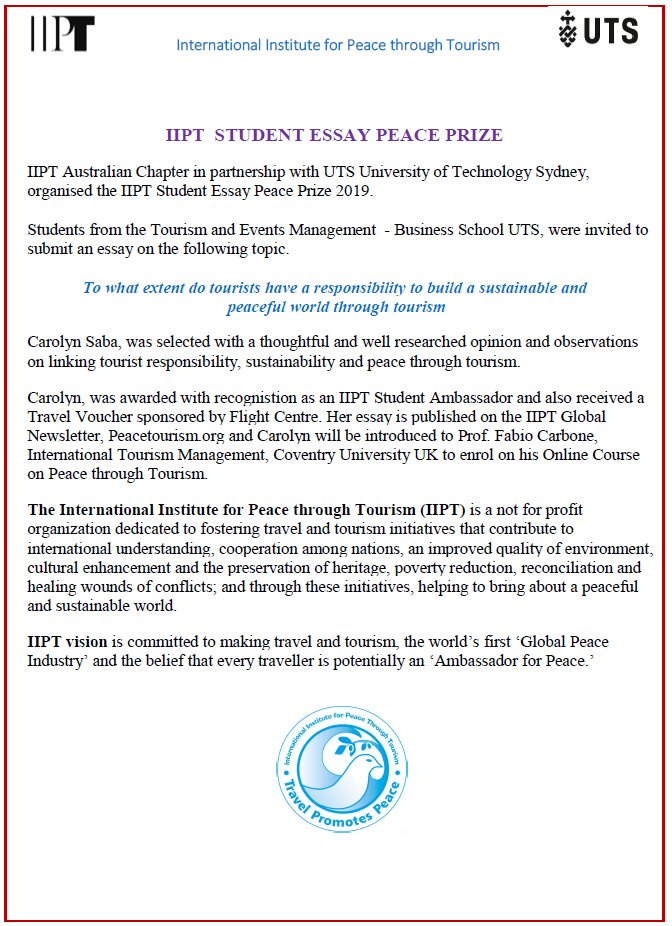Discuss relevant actions that tourists could undertake when visiting a destination

Is it realistic to assume that the tourism industry is a benefactor in building a sustainable and peaceful world? Is it the responsibility of tourists to ensure they contribute positively to the topic of sustainability whilst travelling? These open-ended questions have sparked a debate within the industry for the past three decades, with several experienced professionals providing many compelling arguments for and against the topic of sustainability and peace in travel. There is a need for tourists to view “sustainable development as an opportunity to improve the longevity” (Skift 2017) of the industry, through responsible tourism and peace tourism.
As it is widely recognised that the tourism industry is one of, if not, the largest industry in the world with over 32 million flights carrying 1.2 billion people (UNWTO 2018), the way people travel needs to change to ensure that the needs of today are met without jeopardising the ability of the needs of the future to be met (Telfer 2012). This definition of sustainable tourism development which was first introduced in 1987 when the World Commission on Environment and Development (WCED) published their Brundtland Report, has been adopted by the tourism industry to analyse how its role has affected both civilisation and the environment. For example, when travelling, people can unintentionally offend local communities with their choices of clothing, disrespect sacred sites, generate a significant amount of waste, and visit places that damage the biodiversity (Medium 2016a). Thus, to a large extent, tourists have the responsibility to either positively or negatively contribute to the sustainability of a destination when travelling.
Responsible tourism has been defined as “a behavioural trait … based on the basic principles of respect for others and their environment” (Leslie 2012, p. 20), whilst considering the interests of the local communities residing in tourism destinations. As Sreejesh & Mathew (2017) explained, “responsibility results in clear cut actions” that aim to mitigate “negative social, economic and environmental impacts” and simultaneously work to maximise “positive effects of tourism development” (p. 84). Through different initiatives such as the niche of community-based tourism or the participating in eco-tourism by purchasing environmentally friendly products, the relationship between responsible tourism and the sustainability of destinations is affirmed.
Community-based tourism offers the local products such as the community’s lifestyle and culture to tourists that visit, whilst simultaneously improving the current living standards of the residents and reducing the negative effects of tourism by “protecting the natural and built environment” (ÁlvarezGarcía et. al 2018, pp. 2). This is one of the many ways tourists can experience a social and cultural immersion of a destination whilst creating jobs for the locals, offering additional income, contribute to conservation efforts and facilitate the community’s empowerment (Ngo et. al 2018, pp. 1325). Community-based tourism allows the local communities to maintain their beliefs and retain the benefits whilst ensuring their relationship with tourists coexists sustainably with the environment.

Eco-tourism has been classified as a form of responsible travel “to natural areas that conserves the environment and improves the welfare of local people” (International Ecotourism Society 2019). Although many tourists are conscientious on the negative externalities of the industry such as environmental degradation, many destinations are still capping their tourist numbers, demonstrating that individuals may understand the responsibility of their actions but fail to make the necessary adjustments. In fact, Bray (et. al) found in 2010 that whilst 30% of people claimed to be ethically responsible about the impact of their actions on the environment, only 3% translated this into action by purchasing ethical products. Thus, tourists have the responsibility to purchase sustainable products when travelling by identifying the ones with an environmental certification scheme. This allows travellers to gain all the relevant information on the “environmental performance of destinations and hotels” (Skift 2017) whilst simultaneously avoiding greenwashing, a term coined in 1982 to describe the “outrageous corporate environmental claims” (The Guardian 2016) by businesses.
Similarly, as responsible tourism aims to maintain a sustainable future and a positive relationship between tourists and locals, peace tourism also intends to be a benefactor in enhancing “sustainable development and positive peace through the tourism industry” (Herath 2010). Due to its recent prominence as a global industry, many professionals and institutions have advocated the role of tourism in promoting peace due to its offhand ability to introduce tourists to new cultures and values which results in a mutual understanding and appreciation for diversity. Thus, tourists are encouraged to participate in initiatives such as staying with host families as opposed to stereotypical methods of accomodation, to “enhance their knowledge of other countries and cultures”, mitigating the “master/servant relationship in the tourism industry” (Herath 2010). Activities as simple as visiting built places of worship, partaking in waste cleanup initiatives, or even walking along peace
trails that retell the story of individuals or events that have promoted peace in the past, are examples of ways in which travellers can become ‘peace tourists’. For example, the Expediciones Sierra Norte in Mexico’s Oaxaca region works with “community leaders to develop biking and walking trails that offer tourists an authentic experience whilst preserving indigenous knowledge” (Medium 2017b) which strengthens the relationship between the community and tourists and builds a peaceful environment.
In conclusion, to a significant extent, tourists have the responsibility to use tourism as a development tool to build a sustainable world and contribute positively to communities and the environment. For the last three decades, the topic of sustainability has continued to evolve and successfully resulted in tangible and realistic approaches to dealing with the negative impacts the industry has on the environment. These impacts can be combated, as aforementioned, with tourists being a responsible traveller through involving themselves in peace tourism using home stays, participating in community-based tourism to respect the local culture and maintain a positive relationship, and through ecotourism by buying environmentally friendly products. With the expected increase in travel within the next decade, the words of Taleb Rifai, Secretary General of UNWTO, come into focus; “today more than ever, ensuring that tourism is an enriching experience for visitors and hosts alike demands strong, sustainable tourism policies and practices” (WeForum 2017).
Carolyn Saba (the winner of IIPT Student Essay Peace Prize)



